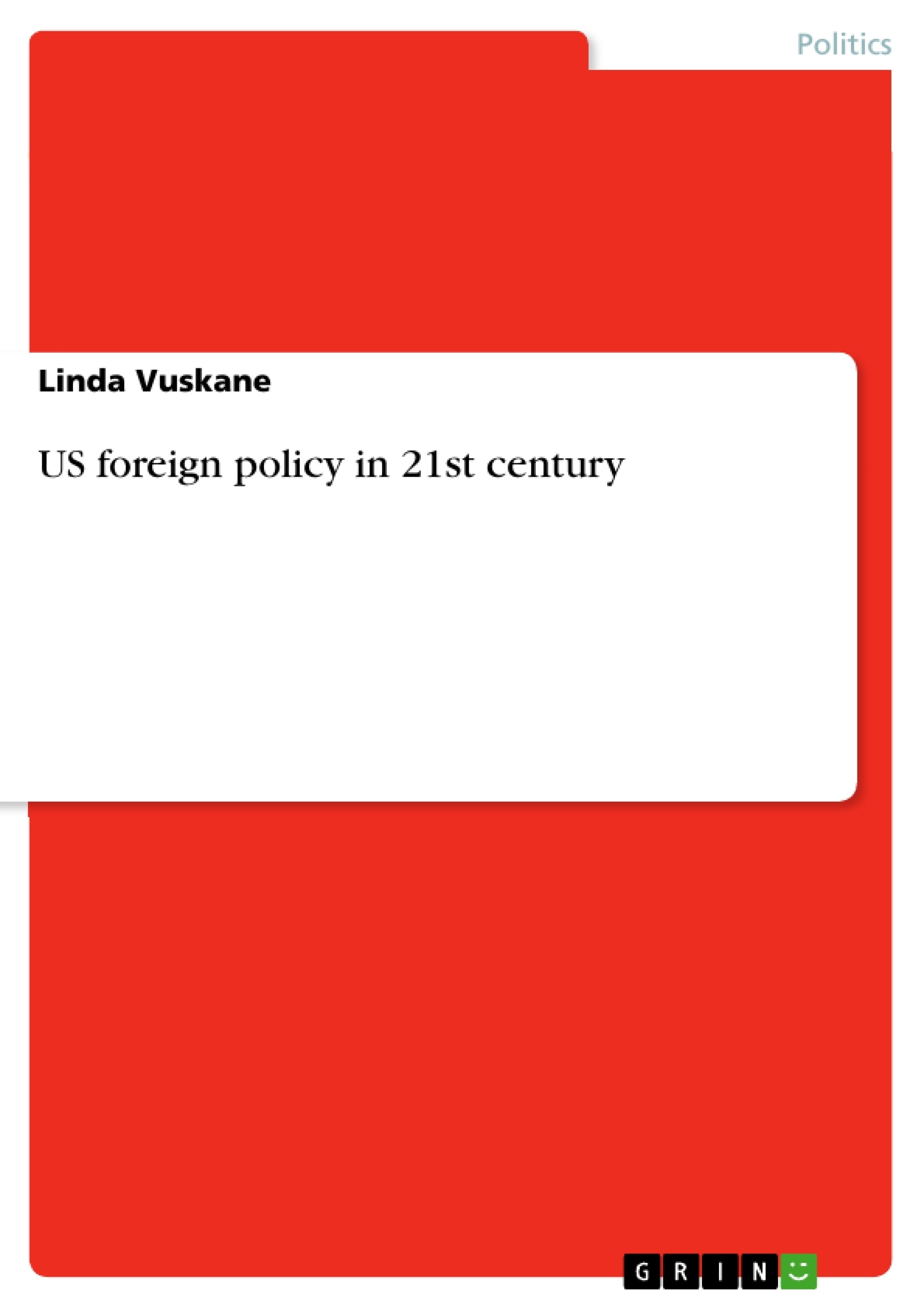The following report aims to answer the question as to whether the principles of US foreign policy have really changed in the 21st century.
The discussion of the US foreign policy will be organised chronologically. First, the principles adopted by G.W. Bush’s administration will be investigated while drawing comparisons to the previous administrations, notably Clinton’s and George H.W. Bush’s presidencies. Further, the approach adopted by the new administration led by Obama will be analysed and finally, conclusions will be drawn.
The main part of the report will deal with national security issues, in particular, with problems associated with the Middle East, as this region has dominated US foreign policy since the end of the Cold War. However, the report will also shortly outline the US position with regards to the global economy and environmental issues.
The 21st century certainly has seen several shifts in the US foreign policy principles, some more dramatic than others. Bush’s and Obama’s administrations, while both following similar goals in general, showed distinctive differences in the approaches to the foreign policy.
Inhaltsverzeichnis (Table of Contents)
- INTRODUCTION
- BUSH'S ADMINISTRATION AND 9/11
- National security policy
- Global economy and environment
- A CHANGE UNDER OBAMA ADMINISTRATION?
- CONCLUSIONS
Zielsetzung und Themenschwerpunkte (Objectives and Key Themes)
This report investigates the evolution of US foreign policy principles in the 21st century. It examines the approaches adopted by both George W. Bush and Barack Obama administrations, focusing on national security, the Middle East, global economy, and environmental issues. The report seeks to identify if and how US foreign policy principles have shifted during this period.
- The impact of 9/11 on US foreign policy
- The shift towards a more unilateral foreign policy under Bush
- The legacy of the War on Terror
- The promise of a more multilateral approach under Obama
- The constraints and challenges facing Obama's foreign policy agenda
Zusammenfassung der Kapitel (Chapter Summaries)
- INTRODUCTION: This chapter introduces the report's objective and outlines the chronological approach to examining US foreign policy principles in the 21st century. It highlights the focus on national security issues, particularly in the Middle East, and briefly mentions the report's coverage of global economy and environmental issues.
- BUSH'S ADMINISTRATION AND 9/11: This chapter examines the foreign policy approach adopted by George W. Bush's administration, drawing comparisons with previous presidencies. It focuses on the national security policy, specifically the development of the National Missile Defence system, the shift to a more unilateral approach, and the impact of 9/11. This chapter also explores the 'Bush Doctrine' and its key elements: pre-emption, regime change, democracy promotion, and confronting the nexus of weapons of mass destruction (WMD) and terrorism.
- GLOBAL ECONOMY AND ENVIRONMENT: This chapter analyzes the US position on global economic and environmental issues during Bush's administration. It explores the country's predominantly multilateral approach to the global economy despite its protectionist tendencies. The chapter also discusses the US environmental policies, particularly its rejection of the Kyoto Protocol, which contributed to a perception of the country as an environmental laggard.
- A CHANGE UNDER OBAMA ADMINISTRATION?: This chapter examines Obama's promise of a more multilateral approach and the challenges he faced in delivering on it. It outlines the policy statements and initial actions of the Obama administration, highlighting its focus on engaging with allies and the United Nations. The chapter also examines the Obama administration's approach to issues like the Guantanamo Bay detention center, the Israeli-Palestinian conflict, and the War on Terror.
Schlüsselwörter (Keywords)
This report focuses on the evolution of US foreign policy principles in the 21st century, with a particular focus on the impact of 9/11, the Bush Doctrine, the War on Terror, and the shift towards a more multilateral approach under Obama. Key themes include national security, the Middle East, global economy, environmental issues, unilateralism, and multilateralism. It analyzes the actions and policies of George W. Bush and Barack Obama administrations, examining the challenges and opportunities they faced in shaping the country's foreign policy agenda.
Frequently Asked Questions
How did US foreign policy change after 9/11?
Under the G.W. Bush administration, there was a significant shift toward unilateralism and the development of the 'Bush Doctrine', focusing on pre-emption and regime change.
What are the core elements of the 'Bush Doctrine'?
Key elements include pre-emption, regime change, democracy promotion, and addressing the connection between weapons of mass destruction and terrorism.
What was Obama's approach to foreign policy compared to Bush?
Obama promised a more multilateral approach, emphasizing engagement with allies and the United Nations, though he faced constraints in implementing this agenda.
Why was the US seen as an 'environmental laggard' during the 21st century?
This perception was largely due to the Bush administration's rejection of the Kyoto Protocol, despite a multilateral approach in other economic areas.
Which region dominated US foreign policy in this period?
The Middle East has been the dominant focus of US foreign policy since the end of the Cold War and through the administrations of both Bush and Obama.
- Quote paper
- Linda Vuskane (Author), 2010, US foreign policy in 21st century, Munich, GRIN Verlag, https://www.grin.com/document/156383



